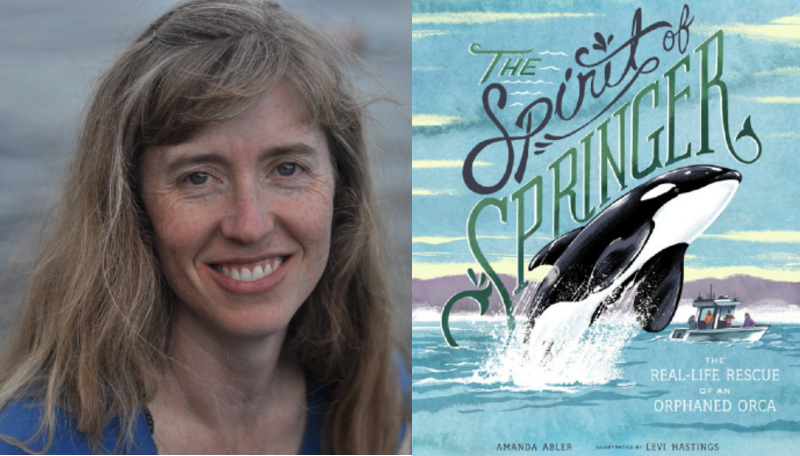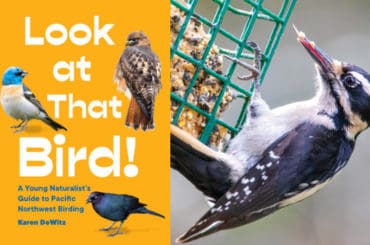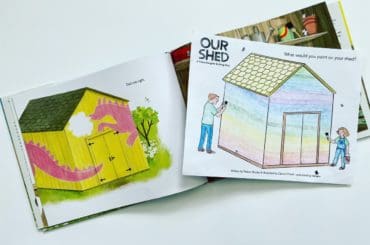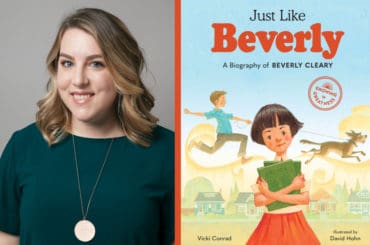Get to know Little Bigfoot author Amanda Abler! Her picture book The Spirit of Springer is the remarkable, real-life rescue story of an orphaned orca calf, Springer (A73) that captured the hearts of whale lovers throughout the Pacific Northwest. In this interview, Amanda shares fun orca facts, her favorite childhood books, what inspired her to become a writer, and more!
What inspired you to write The Spirit of Springer?
I was visiting the Whale Museum in Friday Harbor on San Juan island when I saw a documentary about Springer. I was so enthralled by this little orca and her plight as an orphan trying to get back to her family that I knew at once I wanted to write her story. There is nothing better than a real-life happy ending!
What was your favorite part about researching Springer’s story?
I loved all the reading I got to do about orcas. They are such fascinating and intelligent creatures. I am intrigued by their sense of family and community. Orcas even have different cultures.
You have written three nonfiction books; is that your preferred genre?
Yes, I love writing nonfiction. I have always liked science and learning, so I enjoy getting to read about new things. I feel lucky to get to the chance to choose what I want to learn about and then read everything I can on the topic. I also get to meet and talk with new people when I am doing my research. I get giddy when I know I am going talk to someone and hear about their experiences.
What is the most interesting fact you learned about orcas?
Orcas have a large and highly developed brain. In particular, the neocortex which is associated with higher-order functions such as “thinking,” spatial reasoning, and language, makes up a larger percentage of the brain and contains more folds and surface area (an indicator of brain complexity and ability) than the human brain does. I can’t help but wonder: what are the orcas doing with all those brains? What else can they do that we don’t yet realize?
What was your favorite book when you were a child?
My favorite book was Morris’s Disappearing Bag by Rosemary Wells. I loved the magical aspect of it. I wished and wished that there was a real disappearing bag! I may have even believed that there was one. I also loved A Wrinkle in Time by Madeline L’Engle. She is still one of my favorite authors. I love how she balances the storytelling while weaving in bits of science that seem so real.
What was the most challenging part about writing this book?
I needed to make sure that I had my facts correct. There is a lot of scrutiny—as there should be—in children’s nonfiction books. In doing my research, I often found that reputable sources had conflicting information. In the end, I just tried to be as thorough as possible and check, check, check. I’m also thankful for the copyeditors!
Do you ever worry about Springer now?
Yes, I often worry about Springer, other orcas, and the health of all the oceans. When I hear how much plastic and how many chemicals are going into the ocean every day, I get a pit in my stomach. It is more than I can even comprehend. I do my best to use less plastic and harsh chemicals. Every time I put a yogurt container in the recycling, I think, “Where is that container really going?” I hope that it ends up in a recycling facility.
What was the funniest thing that happened to you when you were writing the book?
When I received the illustrations for review during the publication process, I didn’t realize that the cover wasn’t included, so I thought the inside title page was actually going to be the cover. I was so disappointed! I tried hard to love that plain black and white page with only a whale’s tale on it, but I couldn’t. I was so relieved when I finally saw the actual cover for the book which was—of course—beautiful, thanks to the talented Levi Hastings!
Have you always liked orcas?
Yes! I have always been fascinated by orcas and whales. In high school I had a giant poster of orcas in my room, so it is probably not a coincidence that my first book is about an orca. They seem to be almost magical in their communication, intelligence, and ultrasonic abilities. I just wish we could know what they are saying to each other.
When did you first think about being a writer?
When I was in second grade, there was a book of rhyming poems in the back of the classroom that I could read if I had finished my work early. I loved that book and read it over and over again. The next year, I started writing my own poems. Then in sixth grade, our school had a young authors competition. I wanted to write my own novel for it, just like Judy Blume. I didn’t quite write a novel, but it was a long story and it made me want to keep writing.
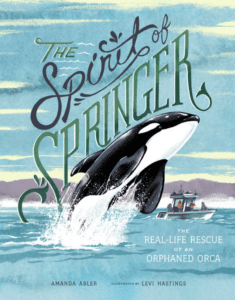 AMANDA ABLER grew up in New Hampshire where she developed a love of snow, being on the water, and maple syrup. Pursuing her interest in science, she earned a B.S. in biology from Massachusetts Institute of Technology. She loves writing nonfiction because of all the interesting things she gets to learn and the new people she gets to meet. The Spirit of Springer is her debut children’s book!
AMANDA ABLER grew up in New Hampshire where she developed a love of snow, being on the water, and maple syrup. Pursuing her interest in science, she earned a B.S. in biology from Massachusetts Institute of Technology. She loves writing nonfiction because of all the interesting things she gets to learn and the new people she gets to meet. The Spirit of Springer is her debut children’s book!
